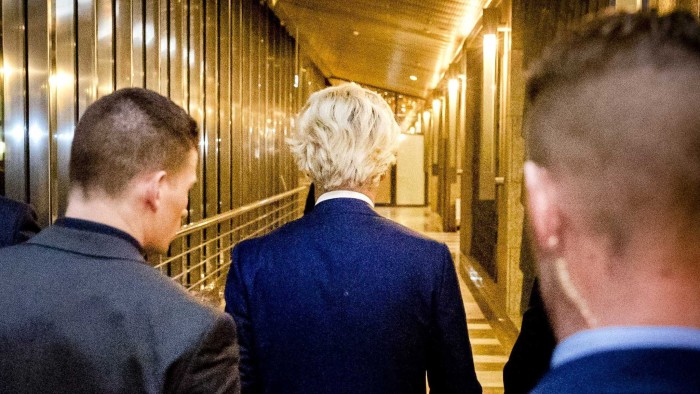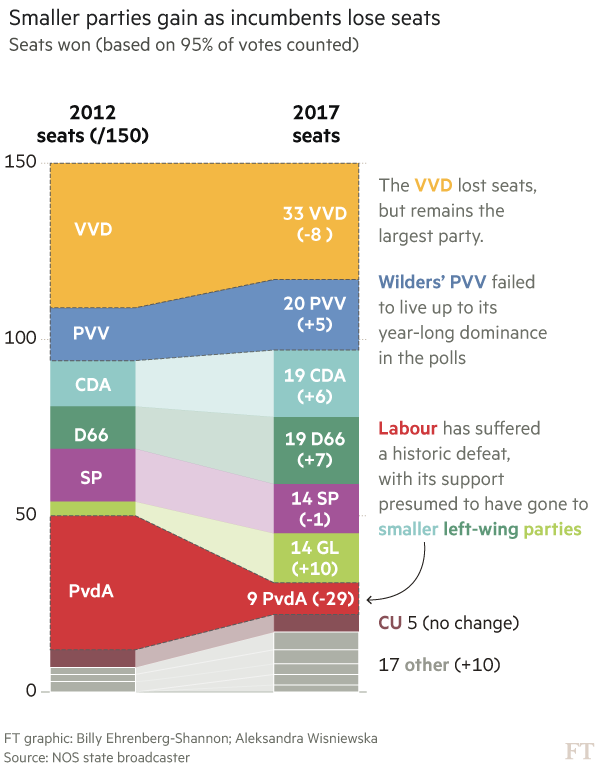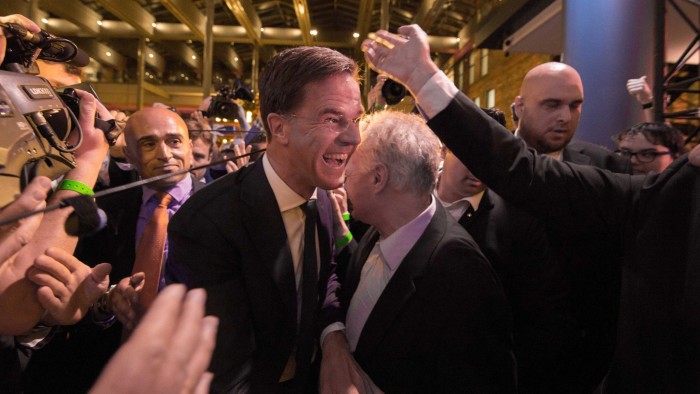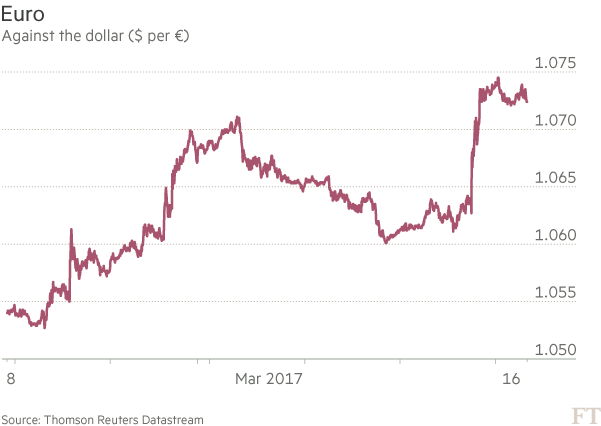Dutch voters crush hopes of populist Wilders
Roula Khalaf, Editor of the FT, selects her favourite stories in this weekly newsletter.

Prime Minister Mark Rutte looks certain to form the next Dutch government, with his party securing a clear general election victory over the far-right populist challenger Geert Wilders.
Mr Rutte’s win was welcomed by moderates and pro-EU politicians across Europe and helped to calm fears that the continent was poised to fall under the sway of nationalists following the UK’s Brexit vote and the election of Donald Trump in the US.
Angela Merkel, German chancellor, called the result “a good day for democracy” and added that she “was very happy that a high turnout led to a very pro-European result, a clear signal”.
The result sent the euro to a five-week high of $1.0707, after the currency surged 1.2 per cent overnight, though by midday it had pared most of its gains.
Despite Mr Rutte’s victory, his VVD party lost eight seats compared with five years ago and his Labour coalition partner suffered a historic defeat, setting the stage for months of upheaval within Dutch politics.
The VVD is set to hold 33 seats, compared with 20 for Mr Wilders’ Party for Freedom (PVV), according to state broadcaster NOS, with 97 per cent of votes counted in Wednesday’s election.

At a packed victory party in The Hague, Mr Rutte hailed his win as an example of voters saying “no to the wrong sort of populism”.
Most of those celebrating did not seem to care that the VVD lost a quarter of its votes. “I’m relieved more than anything,” said one party worker.
In contrast, Labour — the VVD’s coalition partner for the past five years — suffered a dreadful performance. The centre-left party held on to only nine seats, down from 38 in the previous election. Many supporters defecting to other leftwing parties after Labour helped to push through reforms such as raising the retirement age and altering the Dutch healthcare system.
The results reflected the highly fragmented nature of Dutch politics, with the top six parties winning between 14 and 33 seats each. It will make coalition-building complicated for Mr Rutte.
After vowing to exclude Mr Wilders from government during the campaign, he is likely to rely on a grouping of broadly centrist parties to govern — albeit with a strict policy on topics such as asylum and immigration.
The centre-right CDA, which benefited from a late surge in support, spurred by populist policies such as making children sing the national anthem in schools, came third with 19 seats and will probably play a crucial role in any coalition.
The biggest gainers on the night were the pro-EU liberal D66 party, which gained seven seats to win 19, and the leftwing environmental Green Left, up 10 seats to 14. Both parties ran unashamedly pro-EU campaigns and adopted liberal policies on issues such as asylum.
While Mr Wilders’ PVV has had a comfortable lead in polls for much of the past year, voters blanched at the prospect of backing the party at the ballot box. Although 20 seats was a small improvement on its performance in 2012, it would be four fewer than it gained in 2010.
Han ten Broeke, a VVD MP, said: “This time it is not populism that wins, it is responsible leadership.”
The Dutch prime minister enjoyed a popular boost after a diplomatic row with Turkey, during which he banned Turkish ministers from campaigning in the Netherlands, a move that sparked a fierce rhetorical response from Ankara.
The Dutch vote was the first in a trio of European elections in which populist politicians have emerged as significant contenders. Analysts had predicted that a strong showing for Mr Wilders would bolster the campaigns of Marine Le Pen, National Front leader in France and the insurgent anti-immigration Alternative for Germany party.

European leaders celebrated the results as they came in overnight. Paolo Gentiloni, Italian prime minister, tweeted: “No Nexit. The anti-EU right has lost the Dutch elections. Now a common commitment to change and relaunch the Union.”
One of the biggest winners of the election was the Green Left party which won votes at the expense of Labour. On Wednesday night, Jesse Klaver, the 30-year-old Green Left leader, took the stage in front of euphoric, young supporters in a converted factory in Amsterdam that is primarily used to host club nights. “We had hoped that the result would be historic,” said the leader. “It was!”

Green Left, which mopped up votes among younger voters, celebrated by posting a picture of Kermit the Frog shaking with delight on Twitter. At the rally, Mr Klaver said he had been asked repeatedly throughout the campaign by international journalists whether populists would succeed in the election. “No!” chanted the audience.
In total, 28 parties entered the ballot, some barely a few years old. Of the new parties, Denk, a party aimed at attracting Muslim voters, was predicted to win three seats.
Additional reporting by Mehreen Khan and Stefan Wagstyl

Comments